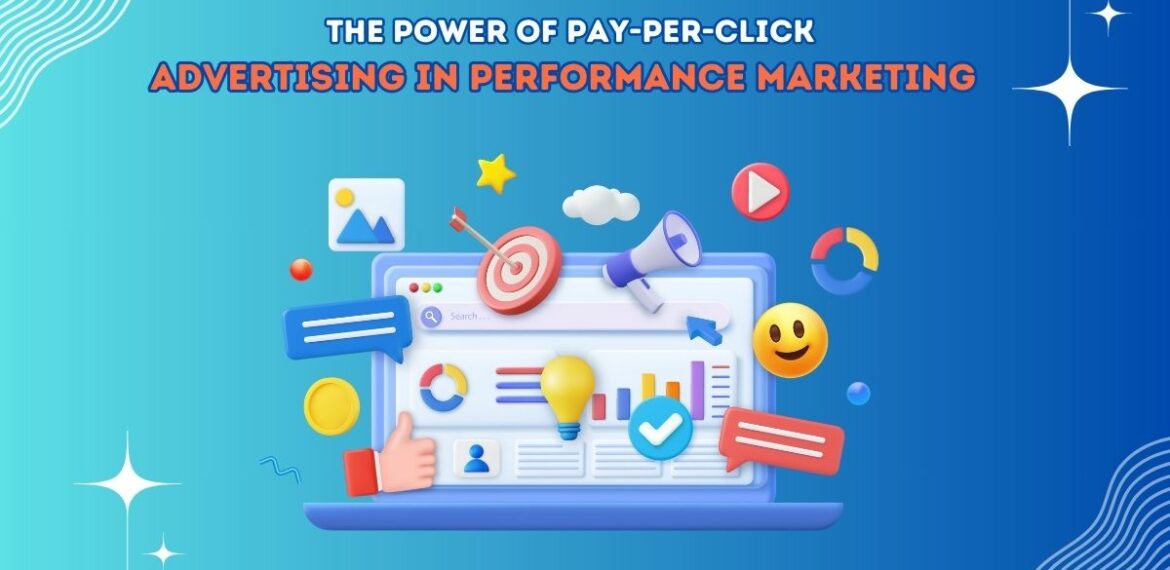
The Power of PPC Advertising in Performance Marketing : Want Rapid Results?
The Power of PPC Advertising in Performance Marketing : Want Rapid Results?
In the rapidly evolving digital landscape, businesses are constantly seeking innovative ways to ensure that every dollar spent on advertising delivers measurable results. Enter performance marketing, a strategy built on accountability and data. At the heart of this results-driven approach is Pay-Per-Click (PPC) advertising, a powerful tool that can transform the way businesses reach and engage their audience. In this blog, we’ll explore the synergy between PPC advertising and performance marketing and why combining these two strategies is key to maximizing return on investment (ROI) and driving business success.
What is Performance Marketing?
Performance marketing is a digital advertising strategy where businesses pay only when a specific, measurable action is completed—whether it’s a click, lead, or sale. Unlike traditional marketing, where you pay upfront regardless of outcomes, performance marketing ensures that your investment is tied directly to the results it generates. This approach allows businesses to focus on campaigns that are driven by tangible outcomes, making it a cornerstone of modern ROI-driven marketing strategies.
Key components of performance marketing include:
- Pay-Per-Click (PPC) advertising
- Affiliate marketing
- Social media advertising
- Email marketing
With its focus on results and optimization, performance marketing helps businesses stay agile, continuously improving their efforts based on real-time data and insights.
Explore related topic: Benefits of Using Performance Marketing for Small Businesses
Performance Marketing vs Traditional vs Digital Marketing: What’s the Difference?
Before diving into how PPC fits into performance marketing, it’s important to understand how this strategy differs from traditional and digital marketing:
| Aspect | Traditional Marketing | Digital Marketing | Performance Marketing |
| Cost | High, fixed costs (e.g., TV, print ads) | Flexible, but costs can vary widely | Pay only for measurable results (e.g., clicks, sales) |
| Targeting | Broad, less specific | More targeted (based on online behavior) | Precision targeting (demographics, behavior, intent) |
| Measurability | Difficult to track ROI | Can be trackable but not always performance-focused | Directly tied to measurable outcomes (clicks, leads, conversions) |
| Scalability | Difficult, requires large budgets | Scalable but may need more time | Highly scalable and adjustable in real-time |
The key advantage of performance-based advertising lies in its measurability. While traditional marketing often focuses on brand exposure and reach, performance marketing and PPC advertising allow businesses to track every penny spent, ensuring maximum ROI.
What is Pay-Per-Click (PPC) Advertising?
Pay-per-click(PPC) advertising, is a form of digital advertising where businesses pay a fee each time their ad is clicked. Unlike traditional ads, where you pay for the opportunity to be seen, PPC ensures you only pay for actual engagement. This makes it one of the most cost-effective forms of performance marketing.
PPC ads are typically displayed on search engine results pages (SERPs), social media platforms, or across websites via display networks. The most popular PPC platform is Google Ads, but others, such as Bing Ads and social media platforms like Facebook and Instagram, also play a significant role in PPC strategies.
Explore related topic: Top 5 PPC Strategies
The Role of PPC in Performance Marketing
In performance marketing, the goal is to optimize campaigns to deliver measurable results, whether that’s a click, lead, or sale. PPC advertising is a perfect fit for this approach because it offers:
- Immediate visibility: PPC campaigns allow businesses to appear at the top of search results instantly, unlike SEO which takes time to build.
- Precise targeting: Advertisers can target specific demographics, locations, devices, and even search intent, ensuring ads are shown to the right audience.
- Measurable results: With PPC, every click and conversion is trackable. You can see exactly how much each action costs, allowing you to fine-tune your campaigns for maximum ROI.
Because you only pay for the clicks you receive, PPC is inherently a performance-based advertising model, making it a key player in any performance marketing strategy.
Benefits of Using PPC in Performance Marketing
PPC is often favored in performance marketing due to its versatility and ability to deliver quick, measurable results. Here are some major benefits:
- Measurable Performance: Every aspect of a PPC campaign is trackable—from click-through rates (CTR) to conversions. This data-driven approach ensures you can constantly optimize your campaigns for better performance.
- Immediate Results: Unlike organic strategies like SEO, PPC delivers almost instant results once your campaign is live, making it ideal for businesses looking for quick wins.
- Precise Targeting: With PPC, you can target specific keywords, audiences, locations, and devices. This level of precision means your ads are more likely to reach people who are ready to engage with your business.
- Cost Control: You have complete control over your budget with PPC. Whether you’re spending a few dollars a day or thousands, you can set your budget and adjust it based on your performance.
- Scalability: As your campaigns succeed, you can easily scale them to increase your reach. PPC offers the flexibility to scale up or down based on results, making it a highly adaptable advertising model.
These benefits make PPC advertising an integral part of a well-rounded performance marketing strategy that drives real business growth.
Maximizing Your PPC Campaign’s Potential
To fully leverage PPC in performance marketing, it’s crucial to optimize your campaigns using the right strategies:
- Keyword Research and Optimization: Successful PPC campaigns start with thorough keyword research. Tools like Google Keyword Planner help identify high-intent keywords that resonate with your audience while maintaining manageable competition.
- Compelling Ad Copy and Landing Pages: Your ad copy must be concise, engaging, and relevant to your target audience. When users click on your ad, the landing page should be optimized to convert, offering a seamless experience from ad to action.
- A/B Testing: Consistently testing different variations of ads (A/B testing) helps you identify which version drives more conversions and engagements.
- Data and Analytics: Use tools like Google Analytics and Google Ads to track and analyze campaign performance. Detailed insights into metrics like CPC, CTR, and ROAS allow you to make informed decisions to improve outcomes.
Other Key Components of Performance Marketing
While PPC advertising is a central pillar of performance marketing, it’s not the only one. Other strategies complement PPC and work in tandem to drive performance-based results:
- Affiliate Marketing: Working with affiliates who promote your products or services on a performance basis—meaning you pay them based on the number of sales or leads they generate.
- Email Marketing: Sending targeted emails to nurture leads and drive conversions.
- Influencer Marketing: Partnering with influencers who can promote your brand and products, often in a performance-based model where they are compensated based on the results they deliver.
When combined, these tactics create a holistic performance marketing strategy that drives long-term growth while delivering immediate, measurable results.
Conclusively, in today’s digital world, Pay-Per-Click advertising in performance marketing is the key to driving quick, measurable results while maintaining complete control over your advertising budget. By using PPC advertising, businesses can effectively target their audience, track results, and optimize their campaigns to ensure maximum return on investment.
If you’re ready to unlock the power of PPC and take your performance marketing to the next level, look no further than Upinfifty, a leading performance marketing company. Our team of experts can help you design and execute tailored PPC campaigns that deliver real, actionable results. Contact Upinfifty today and let us show you how to drive growth through performance-based advertising strategies that work.


